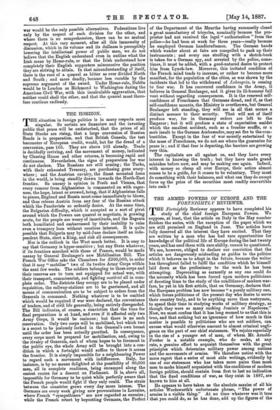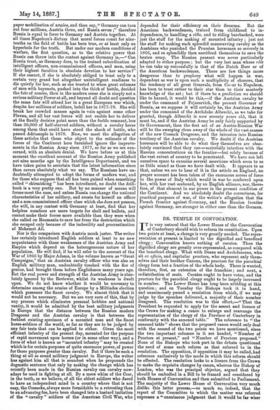THE ARMED POWERS OF EUROPE AND THE FORTNIGIITLY REVIEWER.
THE Fortnightly Reviewer appears to have completed his study of the chief foreign European Powers. We suppose, at least, that the article on Italy in the May number finishes the series, with the exception of the paper which we are still promised on England in June. The articles have fully deserved all the interest they have excited. That they are written by a man who has had rare opportunities for knowledge of the political life of Europe during the last twenty years, and has used them with rare ability, cannot be questioned. We are, however, obliged to declare our conviction that the articles are dangerously misleading as guides to the politics which it behoves us to adopt in the future, because the writer has throughout failed to fulfil the condition which he himself laid down as the preliminary to the work he has been attempting. Deprecating as earnestly as any one could do the necessity which has been forced upon modern politicians of devoting time to the study of the conditions of modern war- fare, he yet in his first article, that on Germany, declares that the European problem has now become " a purely military one, which forces politicians of the present day who desire to serve their country truly, and to be anything more than vestrymen, to spend their time in studying works of military strategy, as though they were so many sucking Jominis or Napoleons." Now, we must confess that it has long seemed to us that this is true, and that nothing but an ignorance of how much in this matter is possible to politicians who are not soldiers, can excuse what would otherwise amount to almost criminal negli- gence on the part of our chief statesmen. We rejoice especially in the rise of a younger set of men, of whom Mr. Arnold- Forster is a notable example, who do make, at any rate, a genuine effort to acquaint themselves with the great principles which determine military power among nations and the movements of armies. We therefore notice with the more regret that a series of most able writings, evidently by one of our statesmen who has taken more pains than most men to make himself acquainted with the conditions of modem foreign politics, should contain from first to last no indication that the fixed conditions of war, as they exist in 1887, are known to him at all.
He appears to have taken as the absolute maxim of all his articles Wordsworth's unfortunate phrase, "The power of armies is a visible thing." At no time whatever was it true that you could do, as he has done, add up the figures of the paper mobilisation of armies, and then say," Germany can turn out four millions, Austria three, and Russia seven ;" therefore Russia is equal in force to Germany and Austria together. At all times Napoleon's dictum that moral forces count for nine- tenths on the field of battle has been true, or at least only an hyperbole for the truth. But under our modern conditions of warfare, the first question, as to the relative power that Russia can throw into the contest against Germany is,—" Can Russia trust, as Germany does, to the trained subordination of intelligent officers, non-commissioned officers, and men, using their highest faculties in absolute devotion to her service I" If she cannot, if she is absolutely obliged to trust only to a certain very grand but altogether unintelligent readiness to die quietly for her, such as she trusted to when great columns of men with bayonets, pushed into the thick of battle, decided the fate of armies, then in the modern sense she is simply not a serious military Power at all, and beyond all doubt and question the same fate will attend her in a great European war which, despite her millions of soldiers, befell her in 1877-78. She will break her crowded masses again in vain against some other Plevna, and all her vast forces will not enable her to deliver at the finally decisive point more than the feeble remnant, less than 30,000 of half-starved soldiers, without a cavalry horse among them that could have stood the shock of battle, who passed Adrianople in 1878. Now, we meet the allegation of these articles that those who object to the estimate of the forces of the Continent here furnished ignore the improve- ments in the Russian Army since 1877, so far as we are con- cerned, with an absolute denial. We have before us at this moment the excellent account of the Russian Army published not nine months ago by the Intelligence Department, and we have taken pains to ascertain that the latest information since then covers absolutely what we say. The Russians have un- doubtedly attempted to adopt the forms of modern war, and for those who suppose that all has been gained when something called " skirmishing " has been introduced, no doubt the drill- book is a very pretty one. But by no manner of means will forms meet the case, and unless Russia can change the national characteristics of her soldiery, and create for herself an officer and a non-commissioned officer class which she does not possess, she will, in any contest with Germany at least, find that her helpless numbers are mere targets for shell and bullets, and cannot make their forces more available than they were when she called on Roumania to save her from the destruction which she escaped only because of the imbecility and procrastination of Mehemet AU.
Nor is the comparison with Austria much jester. The writer has certainly introduced English soldiers at least to no new acquaintance with those weaknesses of the Austrian Army and Empire which depend on the heterogeneous nature of her population. He will find, if he will refer to the account of the War of 1866 by Major Adams, in the volume known as "Great Campaigns," that an Austrian cavalry officer who was also an English military man, undoubtedly touched with the fire of genius, had brought them before Englishmen many years ago. But the real power and strength of the Austrian Army is abso- lutely ignored by the Reviewer, whilst its weakness is dwelt upon. We do not know whether it would be necessary to determine among the armies of Europe by a Miltiades election which possesses the finest cavalry. We almost think that it would not be necessary. But we are very sure of this, that by any process which eliminates personal hobbies and national vanity, it would be admitted by the best military judgments in Europe that the distance between the Russian modern Dragoons and the Austrian cavalry is that between the feeblest existing specimen of a mounted man and the finest horse-soldiers of the world, so far as they are to be judged by any fair testa that can be applied to either. Given the most efficient infantry of the present day, mounted for the purpose of rapid movement upon horses (or in some other way), and a force of what is known as "mounted infantry" may be created which is for certain purposes of quite enormous power, of power for those purposes greater than cavalry. But if there be such a thing at all as sound military judgment in Europe, the writer has against him all that is soundest when he propounds the dogmatic sentence that only by making the change which has recently been made in the Russian cavalry can cavalry now- adays be used in fighting at all. By a mere whim of the Czar, in the teeth, as we believe, of all the ablest soldiers who dared to have an independent mind in a country where that is not easy, the Cossacks, always more formidable to a retreating than to an advancing foe, have been changed into a bastard imitation of the " cavalry " soldiers of the American Civil War, who depended for their efficiency on their firearms. But the American backwoodsmen, trained from childhood to in- dependence, to handling a rifle, and to riding barebacked, were just the stuff for the making of mounted infantry ; just not the stuff for making such splendid manceuvring cavalry as the Austrians who punished the Prussian horsemen so severely in 1866, and so splendidly then sacrificed themselves to save the beaten army. The Russian peasant was never particularly adapted to either purpose ; but the very last man whose rule he can take up successfully is that of the Dutch Boer or of the American backwoodsman. There are few things more dangerous than to prophesy what will happen in war, dependent as war is upon such a multiplicity of chances, that the tendency of all great Generals, from Caesar to Napoleon, has been to trust rather to their star than to their masterly knowledge of the art ; but if there be a prediction we should like to hazard, it would be this,—if the Austrian cavalry be under the command of Pejaeaevich, the present Governor of Bosnia, as we suppose it will certainly be, the Austrian Army under the command of the Archduke Albrecht, as we take for granted, though Albrecht is now seventy years old, that it must be, and if the Austrian Army be only fairly supported by its Government, then the first act of an Austro-Russian War will be the sweeping clean away of the whole of the vast masses of the new Cossack Dragoons, and the intrusion into Russian territory of the Austrian cavalry. We doubt if the Austrian horsemen will be able to do what they themselves are abso- lutely convinced that they can—materially interfere with the Russian concentrations on the frontier—but solely because of the vast extent of country to be penetrated. We have not left ourselves space to examine several assertions which seem to us as little sound as those we have dealt with. It appears to us that, unless we are to hear of it in the article on England, no proper account has been taken of the enormous access of force to the power of Italy which would in war be conferred upon her, with her vast seaboard, by an English alliance, nor, there- fore, of that element in our power in the present condition of the Continent. And we absolutely doubt the correctness, for practical purposes of war, of the writer's allegation that the French frontier against Germany, and the Russian frontier against Germany, are stronger in either case than the German.



































 Previous page
Previous page